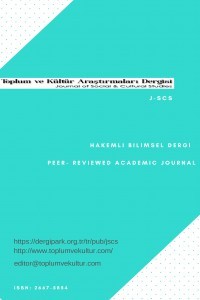Sosyal Bir Olgu Olarak Zaman Kavramının Dönüşümü
Zaman kültüre, topluma ve sosyal pratiklere bağlı olarak hem toplumun hem de bireylerin üzerinde ciddi bir etkiye sahiptir. Zamanın uğradığı her bir değişim direkt olarak özneler tarafından hissedilmekte ve toplumsal düzen buna göre şekillenmektedir. Bu durum, zaman kavramının 21.yüzyıla gelene kadar gerçekleşen her bir gelişmeye paralel olarak dönüşmesine yol açarken aynı zamanda toplumu da dönüştürmeye devam etmektedir. Güneşin doğuşu ve batışı, ibadet biçimleri, bitkilerin yetiştiği dönemlere göre günlük ve kişisel zamanlarını belirleyen bireylerin, insan eliyle oluşturulan ve belirli periyotlara bölünen soyut zamana alışmaları kolay olmamıştır. Bu durum karmaşa, toplumsal yaşamda düzensizlik günlük pratiklerin ritminde dengesizlerin oluşmasına neden olmuştur. Soyut zaman kavramının toplumsal yaşam biçiminin bir parçası haline gelmesi oldukça uzun sürmüştür. Ancak ülkeler arasındaki ticaretin gelişmesi, ulaşımın düzenlenmesi, teknolojinin gelişimi ve para akışının başlaması tek tip zamana göre hareket edilmesini zorunlu kılmıştır. Bu, zamanın anlamının tamamen değişip para ile anılır olmasına ve boş zaman kavramının ortaya çıkmasına neden olurken bireyler arasında zaman kullanımlarının farklılaşmasını da beraberinde getirmiştir. Zamanın yeni biçimlenişi, kadın ve erkek arasında zaman kullanımının farklı hallerde gerçekleşmesine zemin hazırlamıştır. Zira, uygulanan tek tip zamanın sürdürülebilir olmasında etkin rol oynayan kapitalizm, kadın ve erkeğin zaman kullanımını nitel ve nicel olarak farklılaştırmıştır. Ekonomik sermaye sahiplerine, iktidarlara özneleri disiplin etme gücü veren zaman doğaya içkin özelliğinden koparak kontrol mekanizması haline gelmiştir
Anahtar Kelimeler:
Zaman, Zamanın Kavramının Dönüşümü, Boş zaman, Toplumsal Cinsiyet, Toplum
TRANSFORMATION OF TIME AS A SOCIAL FACT
Time affects individuals and society seriously depending on their culture, society and social practices. The transformation of time is felt directly by the subjects and the social order is shaped accordingly.Till the now, the concept of time has been transformed with the effect of social changes and this interaction bring about a perpetual transformation of society. Basic constructions about time such as sunrise and sunset, forms of worship, growing periods of plants determined personal and daily use of time.For this reason, the adaptation to the abstract sense of time produced and divided into specific periodsby individuals was not easy. The continuous transformation of time caused chaos and disorder in social life and instability in the rhythm of daily practices. Transformation of time forcedindividuals to change theperception of time.It took a long time for the abstract meaning of time to be a part of social life. However, the development of trade between the countries, the regulation of transportation, the development of technology and beginning of money flow have made it necessary to act according to the uniform time. These developments led to changes in the meaning of time, the emergence of the concept of leisure time and the differences in time use among individuals. The new form of time has brought about the differentiation of time use practices of women and men. Capitalism played an active role in the sustainable development of uniform time and this led to exist differences between women and men time use in their social, private and working life. The time which gives economic capital owners the power to discipline the society has become the control mechanism by breaking away from the nature
Keywords:
Time, Transformation of Time, LeisureTime, Gender, Society,
___
- Justice”, Feminist Review, No, s.70, 3-29, Palgrave Macmillan Journals. Anderson, B. (2000), Doing the Work Dirty? The Global Politics of Domestic Labour, London, s.Zed Books.
- Arıstoteles, Augustınus, Heiddeger(2007), Zaman Kavramı, Çev. Saffet Babür İmge Kitabevi, Ankara.
- Aytaç, Ö. (2002), “Boş Zaman Üzerine Kuramsal Yaklaşımlar”, Fırat Üniversitesi Sosyal Bilimler Dergisi, Cilt:12, Sayı:1, 231-260.
- Bartky, I. R. (2000), Selling the True Time. 19th Century Timekeeping in America, Stanford.
- Best, S.Kellner, D. (1998), Postmodern Teori, Ayrıntı Yayınları, İstanbul.
- Borst, A. (1997), Computus, Dost Kitabevi, Ankara.
- Bryson, V. (2007), Gender and the Politics of Time, The Policy Press, UK.
- Castells, M. (2008),Enformasyon Çağı/Ağ Toplumunun Yükselişi, Ekonomi, Toplum ve Kültür, Cilt 1
- Çev. Ebru Kılıç, İstanbul Bilgi Üniversitesi Yayınları, İstanbul. Castells, M. (2008a),Enformasyon Çağı, Ekonomi, Toplum ve Kültür, Kimliğin Gücü, Çev. Ebru Kılıç
- Cilt 2, İstanbul Bilgi Üniversitesi Yayınları, İstanbul. Chesneaux, J. (2015), Zamanı Yaşamak, Ayrıntı Yayınları, İstanbul.
- Demir, C. Demir, N. (2006), “Bireylerin Boş Zaman Faaliyetlerine Katılmalarını Etkileyen
- Faktörler İle Cinsiyet Arasındaki İlişki, Lisans Öğrencilerine Yönelik Bir Uygulama”, Ege Akademik Bakış Dergisi, Sayı:1, No:1, 36-48. Fabian, J. (1983), Time and the Other, Columbia UniversityPress, New York.
- Fraser, J. T. (1978), Time, The Familiar Stranger, Amberst.
- Fraser, J. T. (1986), “The Problems of Exporting Faust”, Time, Science, Society in Chine and the West
- The Study of Time, University Of Massachusetts Press, Amherst. Gıddens, A. (1994), Modernliğin Sonuçları, Çev. E. Kuşdil, Ayrıntı, İstanbul.
- Harvey, D. (1997), Postmodernliğin Durumu, Çev. Sungur Savran, Metis, İstanbul
- Hochscıld, A. R. (2000), “Global Care Chains and Emotional Surplus Value”, On the Edge. Living with Global Capitalism, London.
- Le Goff, J. (1980), Time, Work and Culture in the Middle Ages, Chicago UP, Chicago.
- Levine, R. (2013), Zamanın Coğrafyası, Kültürlerin Zaman Algısı Üzerine, Çev. Özgür Umut Hoşafçı, Maya Kitap, İstanbul.
- Mı-Hye, C. (2006), “Gender, Leisure and Time Constraint, Employed Men and Women's
- Experience”, Development and Society, Vol.35, No.1, 83-105. Madeley, J. (2000), Hungry for Trade, How the Poor Pay for Free Trade, ZedBooks, London.
- Nowotny, H. (1994), Time, The Modern and Postmodern Experience, Cambridge, Polity.
- Ogle, V. (2018), Küresel Zamanın Dönüşümü, 1870-1950, Koç Üniversitesi Yayınları, İstanbul.
- Shaw, S. M.(1985), “GenderandLeisure, Inequality in the Distribution of Leisure Time”, Journal of
- LeisureResearch, Vol.17, 266-282. Thrift, N. (1990), “The Making of a Capitalist Time Consciousness”, The Sociology of Time
- StMartin’s Press, New York, 105-129. TÜİK Haber Bülteni, (4 Aralık ) http, s.//www.tuik.gov.tr/PreHaberBultenleri.do?id=18627Erişim Tarihi:11.11.2018.
- TÜİK, 2014-2015 Zaman Kullanım Araştırması http, s.//www.tuik.gov.tr/PreTablo.do?alt_id=1009 Erişim Tarihi:11.11.2018.
- Vısvanathan, N. (1997), “Introduction to Theories of Women, Gender and Development”, The Women, Gender and Development Reader, ZedBooks, London, 17-32.
- Zerubavel, E. (1977), The French Revolution Calender, A Case Study in Sociology of Time
- American Sociological Review, 42, 870.
- Yayın Aralığı: Yılda 2 Sayı
- Başlangıç: 2018
- Yayıncı: Çağatay SARP
